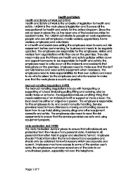Different types of legislation, policies, standards and code of practices that would have influenced the social care provision
Unit17 p4.
There are many different types of legislation, policies, standards and code of practices that would have influenced the social care provision. Which includes The Care Standards Act (2000), Children Act (2004), Terms and conditions of employment and Accountability to professional bodies and line manager all these would have an influence on the social care provision. However, the main TWO which will be explained will be the Health and Care Professionals Council and National Minimum Standards/Essential Standards.
Care standards act 2000: The Act was passed in 2000 the point was to regulate are to reduce the unfairness and the irregularity this involves hospitals, nursing homes and residential care homes and children homes. ‘The main purpose of the Act is to reform the regulatory system for care services’ it has the policies and procedures require CRB checked.
(
Children Act 2004: Children Act 2004 is a wide ranging act covering many areas such as parental responsibility and child protection. This act takes a huge stance that the children's welfare is 'paramount'. This Act also made it clear that opinions from children and young people should be taken into account when decisions about their future are being made. It is important that the Every Child Matters five outcomes are being met (being healthy, staying safe, enjoying and achieving, making a positive contribution and achieving economic well-being) and it is the role and responsibility of the professionals to ensure that these five outcomes are being met.
When working in social care settings members of staff would be expected to follow the terms and conditions of employment. The terms and conditions of employment would include the hours, pay, shifts patterns and training. The employee needs to abide the health and safety rules. If they fail to do so then someone can get hurt or injured very bad then the employer can be sacked from work and put peoples life at risk. Member of staff must receive good pay rate as it can have positive influence on the care given to service users but if service user doesn’t get good pay then staff can unintentionally/intentionally abuse service user for example if staff contributes a lot to the setting but doesn’t get a good care then it can frustrate staff and make them shout ,ignore service user when they need assistance because staff might feel they are not paying enough for he or she to be doing so much for service user which can put service user at risk of abuse. By training not being provided to the staff it could result to lack of knowledge and understanding of their own role and responsibilities which can put service users life in danger so therefore it is important for staff to follow terms and condition of employment as it will benefits the whole organisation including service users, member of staff ad even visitors.









